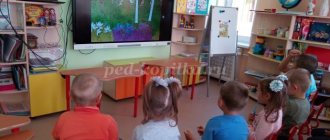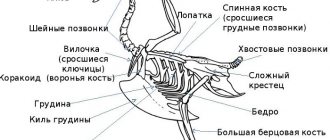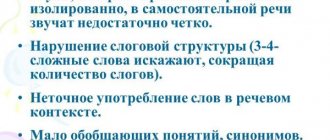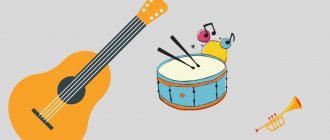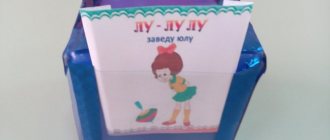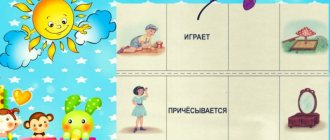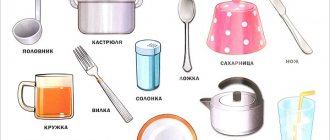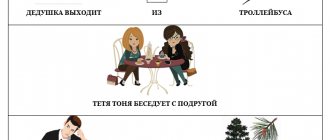Speech therapy games on lexical topics
"ONE IS MANY"
Objectives: formation of plural nouns in the nominative and genitive cases.
For example: no horse, many cows, no pig, many goats, etc.
"BIG SMALL"
Objectives: continue to learn how to form nouns using diminutive and augmentative suffixes.
For example: cat - cat - cat, dog - dog - dog, etc.
"HUGE"
Tasks: formation of nouns with the augmentative suffix -ISCH
For example: cat - cat, cow - cow
"WHO IS BIGGER?"
Tasks: formation of related words
For example: cat - cat - kitten - kitty - cat - kitty - kitty, etc.
“NAME THE MOTHER AND THE BABIES”
Tasks: forming nouns from nouns
For example: crows have crows, owls have owls.
"NAME YOUR FAMILY"
Tasks: forming nouns from nouns
For example: dad is a cat, mom is a cat, children are kittens. This is a cat family.
"A LOT OF"
Objectives: consolidation of nouns in the active dictionary
For example: many cows - a herd, many horses - a herd, many dogs - a pack.
"WHAT IS HE DOING? WHAT ARE THEY DOING?
Tasks: Use singular and plural verbs of the 3rd person present tense.
For example: pecks - they peck, flies - they fly, waves - they wave, etc.
“WHO DOES THIS?”
Objectives: learn to select verbs for a given noun. Select actions for the subject.
For example: she catches mice, purrs, meows, laps - this is a cat.
“WHO IS SCREAMING?”
Tasks: Formation of verbs from onomatopoeia.
For example: a cow moos, a sheep bleats, a goat bleats, etc.
"TELL WHICH"
Objectives: Coordination of adjectives with masculine and feminine nouns, singular and plural, in the nominative case, learning to select adjectives for a given noun
For example: long tail, sharp horns, mustachioed muzzle.
"TELL WHICH"
Objectives: learn to select adjectives for a given noun.
For example: she is horned, big, motley - a cow. He is tall, fast, handsome - a horse, etc.
"WHOSE?"
Tasks: forming possessive adjectives from nouns.
For example: goat fluff, cow's milk, dog's face, etc.
"SAY THE OPPOSITE"
Tasks: compiling complex sentences with the conjunction [a] according to the model. Mastering antonym words.
For example: a horse has a long tail, and a pig…(short), etc. The cat is short, and the horse...(high), etc.
“WHAT PAIL?”
Tasks: Formation of adjectives with a diminutive suffix.
For example: soft, fluffy
“SAY IN ONE WORD, WHAT?”
Tasks: Formation of complex adjectives by merging the stems of two nouns.
For example: a horse has a long mane, it is long-maned; A goat has long hair and is long-haired.
“WHERE, WHERE, WHERE?”
Tasks: use of prepositions ON, IN, IZ, S(SO), UNDER, FOR, etc.
For example: a kitten hid on the floor of the bed, on a shelf, in a box, behind a chair, crawled out from under the bed, from under a chair, out of a box, jumped off the table, etc.
"WHO LIVES WHERE?"
Tasks: Use of prepositional constructions in speech, practical use of the preposition “B” in speech.
For example: a dog lives in a kennel, a cow lives in a barn, a cat lives in a house, etc.
"FUNNY SCORE"
Objectives: learn to coordinate numerals with nouns
For example: a cat has two kittens, a goat has three kids, a sheep has five lambs, etc.
Approximate list of lexical topics with a dictionary for in-depth study in preschool educational institutions
Tatiana Boychuk
Approximate list of lexical topics with a dictionary for in-depth study in preschool educational institutions
Approximate list of lexical topics with a dictionary for in-depth study in preschool educational institutions
Date Topic of the week
September
1 week Diagnostics of children
Week 2 Diagnostics of children
Week 3 Diagnostics of children
Week 4 “Mushrooms”
Nouns: boletus, boletus, russula, toadstool, boletus, fly mushroom, fly agaric, saffron milk cap.
Verbs: grow, collect, cook, cut, dry, salt, pickle.
Adjectives: white, red, red, small, old, edible, inedible.
Adverbs: nearby, close, far.
October
1 week “Vegetables”
Nouns: radish, eggplant, horseradish, garlic, parsnip, caraway, lettuce, tops, pod, harvest.
Verbs: grow, water, dig, excavate, dig up, weed, plant, sow, fertilize, pick, grow, dig in, undermine, grow, cut, cut, plant, replant .
Adjectives: green, yellow, red, blue, red, juicy, round, oblong, strong, bitter, sweet, small, big, small, crunchy. Vegetable, pot-bellied (pumpkin, pimply, thick-skinned.
Week 2 “Fruits”
Nouns: orange, pineapple, banana, pear, cherry, cherry, lemon, plum, apple, apple tree, tangerine, fruit, quince, avocado, pomegranate, persimmon, kiwi, peach, apricot, pit, peel, juice, jam, jam, jam.
Verbs: grow, bloom, ripen, bear fruit, fill, bloom, fade, ripen, ripen.
Adjectives: beautiful, juicy, tasty, sugary, tender, aromatic, pouring, ruddy (apple, lemon, cherry, raspberry (juice, apricot, apple, peach (jam)
.
Week 3 “Berries. Homemade preparations"
Nouns: strawberry, currant, gooseberry, raspberry, blueberry, lingonberry, cranberry, wild strawberry, compote, jam, cloudberry, rowan, blueberry, stoneberry, syrup, jam, jelly, salad, pickle.
Verbs: cook, cut, chop, ferment, can, salt, pickle, dry.
Adjectives: salted, pickled, pickled, pickled, boiled, dried.
Week 4 “Autumn. Trees"
Nouns: autumn, cloud, rain, weather, falling leaves, dirt, earth, dampness, jacket, raincoat, boots, hat, gloves, sweater, umbrella, September, October, November, leaves, trees, birch, oak, aspen, rowan, ash, linden, poplar, maple, larch, alder, willow, chestnut, spruce, pine.
Verbs: turn yellow, blush, fall, pour, blow, step on, wither, drizzle, tear off (leaves, wither, paint, frown, fly around, sprinkle.
Adjectives: yellow, red, dry, cold, wet, gloomy, autumn, slanting, dull, cloudy, golden (autumn, damp (days, dank, torrential, drizzling.
Adverbs: wet, damp, stormy, cloudy.
November
1 week “Wild animals and their young”
Nouns: wolf, hare, hedgehog, bear, elk, fox, boar, tail, horns, paws, hooves, lynx, raccoon, squirrel, beaver, deer, weasel, marten, muskrat, otter, badger, fangs, cheat.
Verbs: walk, growl, jump, shoot, sneak, wander, drive, overtake, lie in wait.
Adjectives: prickly, red, gray, angry, fluffy, cunning, brown, cowardly, striped, club-footed, long-eared.
Week 2 “Wild animals are preparing for winter”
Nouns: Hollow, den, hole, lair. Verbs: store, dig, build, lie down, hibernate (hibernate, catch, hunt, gnaw, drive, catch up, suck
(about a bear - sucks a paw)
. sneak, wander, drive, to catch up, to lie in wait.
Week 3 “ Birds of Migratory ”
Nouns: swallow, crane, rook, starling, swan, swift, stork, lark, thrush, flock, school, wedge, feathers, fluff, wing, beak.
Verbs: fly, fly away, fly over , hibernate, hum, fly around.
Adjectives: downy, crane, duck, goose, swan (song, fidelity)
.
Week 4 “Wintering birds”
Nouns: dove, magpie, crow, sparrow, tit, bullfinch, owl, woodpecker, nuthatch, jay, partridge, waxwing, bunting, hazel grouse, black grouse, wood grouse.
Verbs: fly, search, feed, peck, croak, chirp, ruffle.
Adjectives: red-breasted (finch, migratory (birds)
.
December
Week 1 “Pets and their babies”
Nouns: Cat, dog, cow, goat, horse, pig, sheep, cat, dog, bull, goat, horse, wild boar, ram, herd, herd, flock, pack. Kittens, puppies, calves, foals, lambs, piglets, rabbits, cows.
Verbs: meow, bark, growl, moo, grunt, feed, guard, guard, caress, bite, graze, lick, frolic, play, hatch, graze, swim, feed, squeal, milk.
Adjectives: fluffy, smooth, horned, fierce, affectionate, evil, stubborn, hoofed, milky, meaty, vigorous, fleet-footed, dexterous, clumsy, nimble, black, playful, caring.
Week 2 “Poultry”
Nouns: chickens, ducks, geese, chicks, goslings, ducklings.
Verbs: hatch, hatch, swim, feed, breed.
Adjectives: fleet-footed, dexterous, clumsy, nimble.
Week 3 “Winter. Winter clothes"
Nouns: frost, cold, wind, snow, ice, snowflake, snowfall, piece of ice, fur coat, coat, mittens, boots, felt boots, hat, blizzard, pattern, hoarfrost, drifting snow, blizzard, cold, thaw, sheepskin coat, down jacket, mittens, gloves .
Verbs: go, fall, fly, cover, melt, freeze, fall out, fetter, untie, tie, unfasten, fasten, unlace, lace, undress, dress, put on.
Adjectives: chilly, icy, white, light, fluffy, cold, winter, frosty, sparkling, hard, transparent, sharp, woolen, fur, downy, crackling, harsh, icy.
Week 4 “Winter fun. Preparing for the New Year. New Year's holiday"
Nouns: skis, sleds, skates, snowballs, snowman, slide, skating rink, skis, sticks (ski, shovel, hockey, gate, goalkeeper, goal, fastenings (ski, runners, springboard, crowbar, ice hole, track, stick, puck, slalom.
Nouns: holiday (New Year, carnival, Christmas tree, decorations (Christmas tree)
.
Verbs: dance, celebrate.
Verbs: ride, ride, fall, sculpt, slide, flood, get tired, push off, roll (snowball, someone on a sled, rake, chop (ice, land, accelerate, creak (about runners, crunch (about snow )
.
Adjectives: ski, fast, sharp (ice, skates, winter, slippery, toboggan, sparkling, sticky, ice fishing )
.
Adjectives: New Year's.
January
1 Week -
Week 2 “Man. Body parts"
Nouns: hand, finger, nail, palm, leg, knee, back, stomach, eye, nose, mouth, ear, shoulder, elbow, wrist, foot, heel, shin, thigh, chest, neck, eyebrow, forehead, temple, cheekbone, nostril, back of the head, hairstyle, bangs, parting, mustache, beard, eyelashes, health, hardening.
Verbs: take, put, walk, run, jump, scratch, scratch, frown, wrinkle, comb, smile, carry, stroke, throw, bend, nod, unclench, squeeze, straighten, bend, clap, twist.
Adjectives: long-haired, cropped, tall, short, red-haired, fair-haired, dark-haired, blue-eyed, brown-eyed, green-eyed, gray-eyed, broad-shouldered, long-legged, frontal, eyed, one-eyed, one-legged, shaggy, curly.
Week 3 “Transport”
Nouns: car, bus, metro, tram, trolleybus, train, plane, ship, helicopter, boat, truck, driver, stop, boat, station, conductor, ticket, garage, pier, airport, rails, sleepers, rocket, ferry, train, refrigerator, highway, dump truck, sailboat, taxi, cart, pilot, navigator, bicycle, motorcycle.
Verbs: go, sail, fly, honk, stop, stand, repair, break, cast off, moor, brake, taxi, repair, skid, fly up, fly off, take off.
Adjectives: fast, express, passenger, cargo, underground, air, sea, automobile, snow removal, railway, land, river.
Week 4 “Traffic rules. Transport on the streets of my city"
Nouns: wheel, steering wheel, door, glass, road, pedestrian, street,
crossing , headlight, traffic light, cabin, turn, interior, engine, overtaking, accident, sidewalk, ditch, brake, body, siren, intersection , fuel.
Verbs: approach, stop, skip, run across .
Adjectives: ambulance (help, fire, police (cars, emergency (car, horse riding)
.
February
Week 1 “Materials and Tools”
Nouns: hammer, axe, saw, screwdriver, pliers, needle, scissors, knife, drill, wood, metal, glass, plastic, rubber, leather, fabric, paper, stone, vice, plane, shovel, rake, nail, firewood, nut, screw, iron, copper, gold, silver, belly, cotton wool, wool, chintz, nylon.
Verbs: hammer, chop, saw, unscrew, twist, sew, cut, dig, rake, clamp, assemble, disassemble, dig, bury, dig up, dig up .
Adjectives: leather, metal, silver, nylon, wood, down, glass.
Week 2 “Professions. Construction"
Nouns: construction, bricklayer, concrete worker, painter, electrician, plumber, excavator operator, welder, carpenter, glazier, foreman, architect, masonry, brick, wall, panel, block, roof, paint, crane, foundation, cement, tractor, bulldozer, pile, pit, parquet floor, parquet, tiler.
Verbs: lift, lay, manage, paint, assemble, mount, build, level, erect, install, plan, glaze, weld, landscape.
Adjectives: high, low, beautiful, block, brick, wooden, urban, rural, high-rise, comfortable, reinforced concrete, multi-storey.
Adverbs: beautiful, neat, even, straight, high, fast.
Week 3 “Defenders of the Fatherland”
Nouns: soldier, Motherland, sniper, officer, rocket man, tankman, paratrooper, commander, rocket, tank, pilot, border guard, hero, parachute, bomb, courage, enemy, submariner, anti-aircraft gunner, infantryman, volunteer, traitor.
Verbs: to fight, to defend, to fight, to wound, to bandage , to cure, to win, to fight, to restore, to resist.
Adjectives: brave, courageous, heroic, courageous, daring, cowardly, valiant, military.
Week 4 “Seasons. Calendar. Spring"
Nouns: winter, spring, summer, autumn, Monday, Tuesday, Wednesday, Thursday, Friday, Saturday, Sunday, morning, day, evening, night, icicle, thaw, thaw.
Verbs: warm, freeze, hang, grow, lengthen, shorten, chirp, chirp, warm up, warm up, warm up, freeze, freeze, freeze, thaw , advance, retreat, sparkle, ring.
Adjectives: spring, winter, sunny, warm, cool, harsh, bright, loose.
Adverbs: warm, cold, damp, dirty, light, bright, loud.
March
Week 1 “Mother’s Day. Family"
Nouns: gift, flowers, mother, grandmother, great-grandmother, father, grandfather, great-grandfather, son, daughter, grandson, granddaughter, brother, sister, nephew, uncle, aunt.
Verbs: care, love, respect, try, help, cook, clean, wash, iron, set (on the table, wash, work, wipe, dry, look after, raise.
Adjectives: dear, beloved, caring, adult, small, affectionate, kind, hardworking, strict, polite, obedient.
Week 2 “Early signs of spring. First flowers"
Nouns: primrose, ice drift, puddle, stream, willow, bud, snowdrop, coltsfoot, dandelion, daffodil, hyacinth, bud, petal, leaf, mimosa, tulip.
Verbs: melt, warm, bloom, blossom, swell.
To be freed (from snow, ice, to settle, to become weathered, to smell.
Adjectives: bright, loose, small, fine, fragrant, smooth, fragile, tender, fluffy.
Week 3 “Electrical appliances. Studio"
Nouns: click, cotton, wool, knitwear, customer,
fitting , spool, thread, needle, scissors, style, size, iron, refrigerator, coffee grinder, vacuum cleaner, meat grinder, watch, sleeve, collar, pocket, TV, cutter, seamstress, linen, nylon, button, template, mixer, toaster, electric kettle.
Verbs: facilitate, speed up, cut, sew, try on , iron, knit, hang, fold, wash, cook, cook, fry, baste, stitch, weave, fasten, unfasten, unfasten, fasten, rip, embroider, sew, sew on, outweigh .
Adjectives: multi-colored, narrow, wide, comfortable, chintz, linen, silk, wool, knitted, seasonal, lightweight, washing, sewing.
Week 4 “Spring in nature”
Nouns: March, April, May, month, sun, sky, murmur, ringing, drops, resin, rook.
Verbs: wake up, step on, crack, break, gurgle, break through, awaken, crawl out, bring out, feed, train.
Adjectives: early, late, loud, joyful, rainy, noisy, fine, bright, beautiful, bright.
April
1 week “People’s work in spring”
Nouns: shovel, rake, greenhouse, bed, vegetable garden, garden, flower bed, seeds, seedlings, seedlings, planting, field, tractor, tractor driver, watering can, greenhouse.
Verbs: plant, sow, water, whiten, prune, fertilize, dig, replant, set out , transplant, dig up, bury , dig up, dig up.
Adjectives: early, late, spring (wheat)
.
Week 2 “Space”
Nouns: Earth, Moon, Sun, space, planet, star, ship, rocket, astronaut, satellite, comet, constellation, station, spacesuit, compartment, weightlessness, nebula, telescope, astronomer, eclipse, orbit.
Verbs: fly, fall, take off, land, land on the moon, reflect.
Adjectives: solar, lunar, terrestrial, stellar, cosmic, artificial, interstellar, interplanetary.
Week 3 “Return of the birds. Insects"
Nouns: swallow, nightingale, thrush, rook, starling, crane, lark, swift, heron, beetle, dragonfly, ant, mosquito, wasp, bee, spider, fly, caterpillar, egg, nest, goldfinch, cuckoo, lapwing, sandpiper, bittern, finch, wagtail, pupa, larva, water strider, bumblebee, butterfly.
Verbs: fly, curl, flutter, soar, rush, put off, twist, hibernate, hatch, coo, chirp, cuckoo, chirp, click, ring.
Adjectives: fast, migratory , vocal, hardworking, cheerful, loud, agile, friendly, caring, perky.
Week 4 “Dishes. Food"
Nouns: set, plate, cup, saucer, fork, spoon, knife, kettle, ladle, saucepan, frying pan, milk, butter, yogurt, kefir, sausage, meat, cutlet, ham, sausage, sausage, bread, bun, pie, cake, compote, jam, candy, soup, salad, cereal, colander, rolling pin, baking sheet, curdled milk, coffee pot, bowl, taste, smell, aroma, spices, sauce.
Verbs: cover, cook, wash, fry, boil, simmer, boil, heat, beat, spread, bake, cut, chop, cool, heat.
Adjectives: dairy, meat, bakery, creamy, vegetable, smoked, sunflower, flaxseed, soy, corn, cotton, olive, kitchen, table, deep, shallow, tea, sweet, salty, sour, fatty, tasty, warm, cold, hot.
May
Week 1 “Animals of hot countries”
Nouns: lion, elephant, giraffe, zebra, rhinoceros, crocodile, gazelle, antelope, leopard, camel, turtle, hippopotamus, monkey, cheetah, desert, hunting, jungle, savannah, Africa, Australia, kangaroo, koala, platypus, parrot, monitor lizard
Verbs: hunt, hide, hide, live, jump, climb, run, run away, catch up, graze, fear, defend, attack, sneak up.
Adjectives: striped, spotted, fleet-footed, slow, marsupial, hardy.
Week 2 “My City”
Nouns: city, Barnaul, address, street, lane,
avenue , boulevard, square, river, park, theater, shop window, library, monument, kiosk, lawn, entrance, station, new building, square, stadium, highway, sidewalk, landscaping, district, museum, church.
Verbs: live, build, rebuild , move , travel, look, grow, prettier, expand, improve.
Adjectives: urban, rural, Barnaul, wide, spacious, straight, narrow, multi-storey, old, quiet, noisy, green, stone, industrial, cultural, residential.
Week 3 Diagnostics
Week 4 Diagnostics
List of lexical topics for logo lessons in the preparatory group
The teacher’s task is to explain to children the concepts of “sound”, “word”, “louder”, “quieter”, and everything related to the perception of sounds. You can choose different themes: “Dishes”, “Space”, “Animals”.
Phonetic-phonemic underdevelopment of speech in preschool children
An open lesson differs from a regular lesson primarily in that inspectors are present, so the teacher must take care of creating a playful, relaxed environment for the children.
Lexical topic “Family”
To expand the vocabulary of children in preschool educational institutions, the teacher conducts a lesson. The lexical topic “My Family” in the middle group is suitable for an open lesson. She can also be selected for classes in a preparatory group.
Questions that a speech therapist can ask children during the lesson:
- “Do you have an older brother or sister?”;
- “Which utensil is your favorite: a cup or a plate?”;
- “What is the name of the country where you and your family live?”
The main task of the teacher is to expand the vocabulary of children. If a parent is present at the lesson to check the quality of education, then a presentation is required, and handouts are also used.
Important! Drawing is a great way to develop fine motor skills and attention in children. In the “Family” lesson, children can draw their parents and themselves, and then talk about who they depict in the drawing.
Speech therapy lesson on the topic “Defenders of the Fatherland”
Speech therapy is needed both for speech development and for the general education of children. The purpose of an open lesson on the topic “Defender of the Fatherland” is to develop patriotism and an understanding of why defenders are called heroes.
During the classes:
- Introductory part, announcement of the topic.
- Conversation about the holiday “Defender of the Fatherland Day”.
- Physical education moment.
- Continuation of the conversation. The teacher asks questions: “Do you know who the defenders of our Motherland are”, “What is the name of the profession of a person who drives a tank”?
Important! You need to open the lesson by announcing the topic and explaining it. The teacher also points out to the students that there are “guests” in the room who will carefully observe the “journey.”
Speech therapy lesson on the topic “Clothing” in the preparatory group
A lesson on the topic “clothing” is conducted in order to introduce a preschooler to everyday life and teach him to recognize different elements of clothing: socks, T-shirts, pants, skirts, dresses.
Progress of the lesson:
- Introductory part. Meeting the observers and wishing each other good morning.
- Exercise: “And in my closet...” The child tells what is in his closet: boots, pants, T-shirt, jacket.
- Exercise "What's in the picture?" The teacher shows a card with a picture of a girl in a dress or a boy in shorts and a T-shirt, and the children name the items of clothing.
- In the middle of the lesson there is a physical warm-up.
- The end of the lesson is time for summing up. Preschoolers work with an interactive whiteboard and make sketches in a notebook. This is necessary to consolidate the acquired knowledge.
When certification is carried out, the speech therapist must show what the students have learned over the year. The main task is to open and conduct the lesson correctly, maintaining a positive attitude among children.
Games on sound culture of speech in secondary and preparatory groups
Speech therapy lesson in a preparatory group on the topic “Furniture”
The correctional and developmental task of the lesson on the topic “Furniture” is to develop creativity, thinking, fine motor skills and speech. For the lesson you will need pictures of furniture, tablecloths, a ball, dolls, and slides.
During the lesson, the speech therapist asks the children riddles, and then shows the slides, asking the question: “What piece of furniture is shown in this picture?”
At the end of the lesson, a didactic game is played. “Grandma Masha” came to visit, and the children must explain to her what kind of furniture is in the office: metal, plastic, wood.
Lexical topic “Winter” in the preparatory speech therapy group
For an open lesson, the lexical topic of winter is suitable for a preschool speech therapy group. The speech therapist draws up notes in advance and prepares several didactic games for children:
- “Find a vegetable that grows in winter”;
- “What falls to the ground in winter? (snow). Does it rain? And the sun?
- "New Year". On the cards, children show the attributes of the holiday and tell how they celebrate the New Year at their home.
Important! The main goal of the lesson is to teach the child to identify the seasons and understand what winter is. In addition, all tasks are performed collectively; kindergarten students interact with each other during the lesson.
“Birds of Migratory” - topic for spring speech therapy class in the preparatory group
When spring comes, children study the topic of migratory birds in kindergarten, and an open lesson may be held to assess the compliance of the program with the Federal State Educational Standard.
Progress of the lesson:
- The speech therapist asks the children a riddle, and in response to the answer, asks whether it is a migratory bird or not.
- Demonstration material is used to show children all the birds that fly away to warmer climes for the winter.
- During the lesson, the speech therapist monitors the children’s speech, and also from time to time asks the question which letter is the first in the word - a vowel or a consonant.
- In the middle of the lesson, finger exercises and a light warm-up are performed.
- To consolidate their knowledge, children are asked to name all the migratory birds: rook, swan, nightingale, cuckoo.
Additional Information! The lesson must be held in a playful way so that the children do not get bored, but join in with interest in what is happening and answer questions. Additionally, children can bring a homemade drawing of a bird to class.
Lexical topic “Animals of the North” for the preparatory group
To go to first grade, a child must know which animal lives in which area, what a hot climate or the north is. During a lesson on the topic “Animals of the North,” preschoolers will learn about animals such as penguin, polar bear, seal, and reindeer. To consolidate the acquired knowledge at home, children can watch a family film or documentary.
During the lesson, the speech therapist introduces children to the world of the Far North, asking riddles and reading poetry. The task is given - to find Moscow, St. Petersburg, and then the Far North on the map.
As a physical warm-up, children pretend to see penguins and seals swim and try to “walk on snow.”
Open lessons are a good opportunity to evaluate the activities of the speech therapist in the kindergarten and adjust the program if necessary.
How to organize a speech therapy session in a preparatory group of a preschool educational institution
At the first stage, the lexical topic of the “Family” lesson in the preparatory group or any other topic is selected. The speech therapist’s task is to draw up notes and include in the lesson plan tasks for the development of speech, motor skills, memory and attention.
It is necessary to organize speech therapy classes at the preschool educational institution “Defenders of the Fatherland” in accordance with the standards of the Federal State Educational Standard. The inspectors will evaluate not only the teacher’s activities, but also the program’s compliance with the basic requirements of the educational system in the Russian Federation.
Specifics and preparation of an open logo session
After determining the topic of the lesson, for example, “Transport in the city,” the speech therapist draws up a lesson plan - a summary. It is necessary to provide 3-4 game actions and several questions of the following type: “There is fruit on the table. Do you know what this is? Apple or pear?
When drawing up a plan, the goals and objectives of the speech therapy lesson must be taken into account:
- training in word synthesis and sound analysis;
- development of motor skills;
- correction and development of hearing, orientation in the sound system of the Russian language;
- development of visual perception, orientation in space;
- fostering perseverance and accuracy.
Additional Information! An important organizational point is the preparation of the necessary demonstration and handout material. The following are suitable for an open lesson: cards with letters and sounds, envelopes with tasks, pictures, toys-fishing rods, fish, markers and pencils for drawing.
To help the speech therapist: lesson plan with exercises according to the Federal State Educational Standard
A summary is a detailed description of the course of the lesson point by point. Using his notes, the speech therapist conducts an open lesson, and no task will be missed.
Open lesson progress:
- Introductory part. To the music, the children enter the classroom, after which the speech therapist tells them that there are guests today and names the topic of the lesson.
- Psychophysical warm-up. Before the lesson starts, children play a game with a ball. Everyone stands in a circle, after which the teacher announces that they have a magic ball in their hands that will give everyone a good mood. You need to call each other by name and pass the ball.
- Breathing exercises. Children "stand on the ship and breathe the fresh sea air."
- Exercise to develop visual attention. The teacher shows the pictures and the children say what is shown on them.
- Then comes the main part of the lesson. The speech therapist says the beginning of the word, and the children finish it, for example: para-hod, bicycle.
- To develop sound synthesis and analysis, perform the “collecting flowers” exercise. The child must collect flowers with petals where the “l” is at the beginning of the word, then in the middle and at the end.
- The end of the lesson is physical warm-up and consolidation of the results, summing up.
Important! If there are children with disabilities or children who need speech correction in the group, individual tasks should be developed for them.
